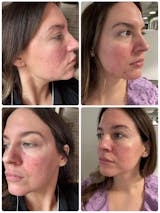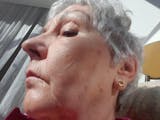From our gentle cleansers to our nourishing moisturizers, all products by Clearly Basics have been designed to work well with each other to effectively fight acne while being kind to sensitive skin.

As you can see, the Clearly routine is pretty simple, and on most days, you might find you don’t need much else.
Still, there are days when we'd like to dress up and go wild with our makeup. Or days when we’d like to add a little luxury to our routine with a face mask (and a relaxing scented candle). To choose products that safely complement your Clearly routine - and that are nice to acne-prone skin, here’s what to look out for:
For Any and All Products
Be it your sunscreen, makeup, or even your hair products, keep an eye out for the “non-comedogenic” label. This means they won’t clog pores – which can lead to acne. If the label is nowhere to be seen, take a look at the list of ingredients for red flags such as cocoa butter and lanolin. If you’re still not sure if a product is comedogenic, don’t be afraid to ask the sales assistant or customer service line. Or, ask us! We’re always ready to help.
For Sunscreen
At the risk of sounding like a nagging parent, we have to say this again: sunscreen is a MUST. Yes, even when it’s cloudy outside and even when you’re indoors. This is especially important when you have acne. You know those red marks you get after acne has cleared? They can quickly collect melanin and turn into stubborn brown marks when exposed to sunlight.
When choosing a sunscreen, go for a lightweight, broad-spectrum one with at least SPF 35+ and a PA+++ rating. Ingredients to avoid include heavy oils, such as coconut, and fragrance. If you’re concerned about skin looking ‘shiny’, look for products with a matte finish.
For Face Masks
While face masks don’t often stay long enough on the skin for them to make a huge difference, they can be a great addition to your routine – especially when you need a little pampering.
Look for face masks targeted at your skin concerns. For acne, consider ones with exfoliating and anti-inflammatory ingredients such as tea tree oil, bisabolol, and niacinamide. That said, you’d want to be careful and make sure the actives won’t clash with the retinol in Clear Out. For hydration, look for face masks with hyaluronic acid, and to tackle fine lines, masks with antioxidants such as vitamin C and resveratrol are good choices.
If you have oily or acne-prone skin, you might want to try clay masks instead of sheet masks or any thick, creamy ones. Ingredients such as kaolin and bentonite can help with clogged pores, drawing out impurities, absorbing excess oils, and speeding up the healing of active acne.
It’s also best to avoid DIY masks if you’re unsure how your skin might react to them. For example, ingredients such as lemon, baking soda, and garlic can dry and irritate skin.
For Exfoliants
Regular exfoliation can brighten and soften skin, as well as help with breakouts by removing the build-up of dead skin cells. While physical exfoliants such as sugar scrubs feel good, they can irritate and inflame skin.
Chemical exfoliants, such as the AHA and BHA in Balancing Cleanser, could be a better alternative for you as they can break down dead skin cells without the harsh friction.
For Makeup Remover
On days when you’re wearing heavy makeup, we recommend a double cleanse. Start removing makeup with an oil-based cleanser and follow with So Fresh or Balancing Cleanser. An oil-based cleanser helps dissolve the oils from your makeup and your pores while keeping skin moisturized, making it a great choice for those with oily skin. Look for a formula that is free of possibly irritating ingredients such as fragrance and alcohol.
If your makeup is light, however, a thorough wash with your preferred cleanser is enough.
For Makeup
Be it your foundation or your blush, look for hypoallergenic, water-based makeup. This means the first ingredient on the list should be water. You can also consider mineral-based cosmetics, with ingredients such as titanium dioxide and zinc oxide, which don’t clog pores.
Also, while sharing is caring, it’s best to keep your makeup products to yourself to prevent any transfer of bacteria, oil, and dead skin cells from person to person.
Want to safely introduce new products to your routine but are unsure how?
Send any questions you have our way via Messenger chat or Instagram DM (@clearlybasics)!
Disclaimer: This article should not be interpreted as personal medical advice. For medical-related matters, please consult your dermatologist.






